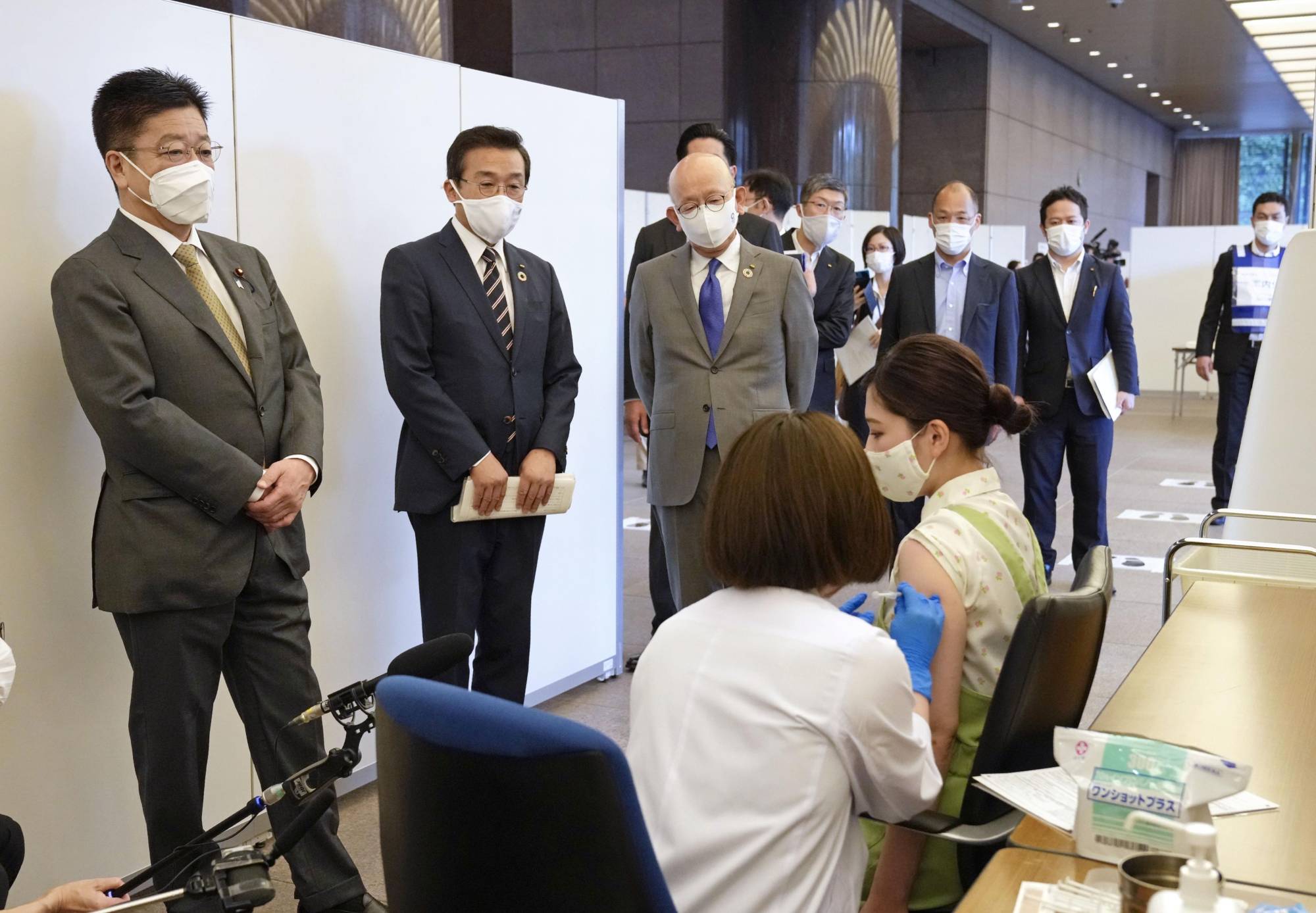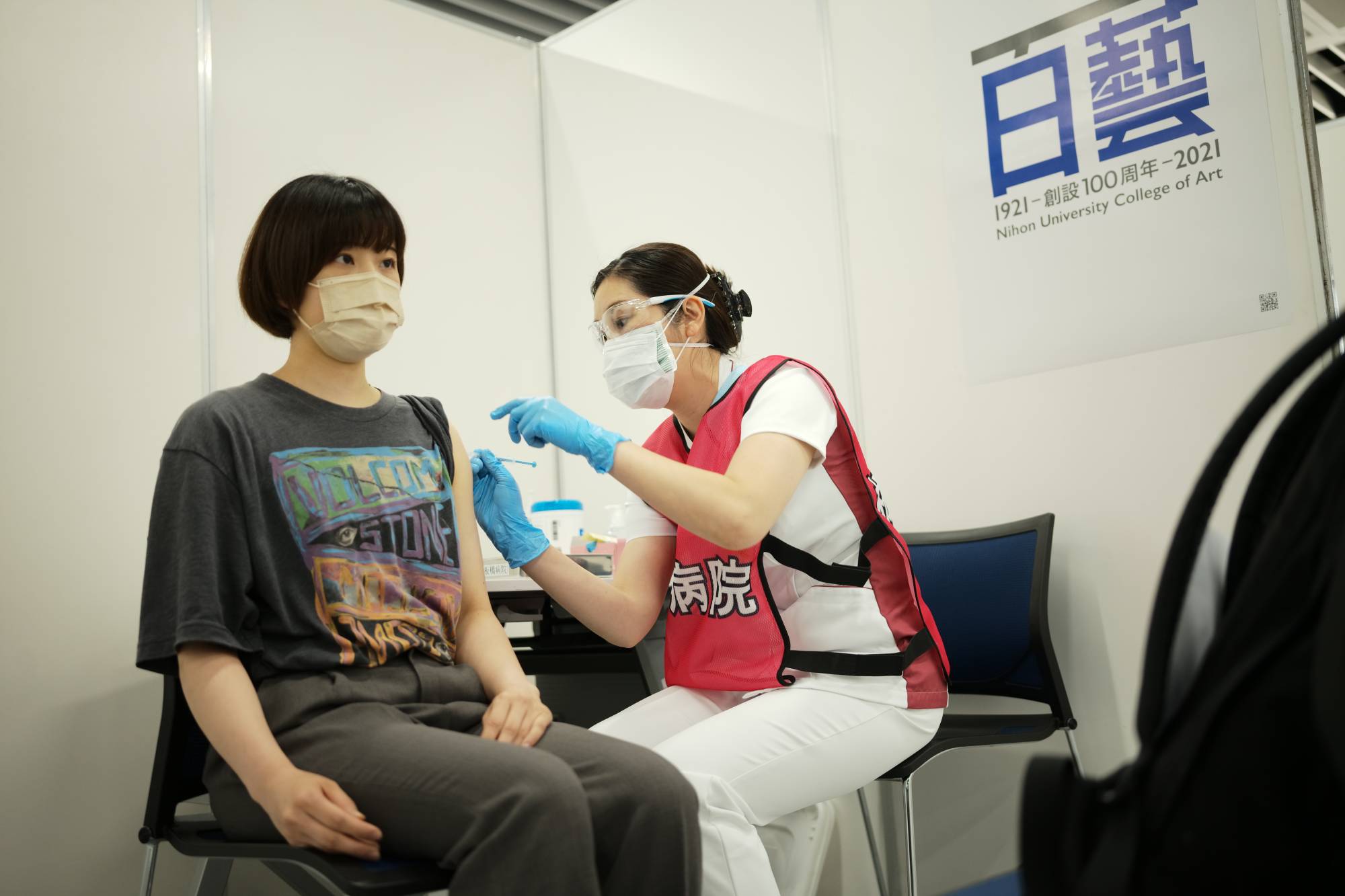A significant number of workplaces and universities across Japan initiated their own vaccination programs Monday, giving Japan’s inoculation effort its widest reach with the general public so far and adding further momentum to the rollout, which has been gathering steam after a slow start.
According to the Prime Minister’s Office, the government had received applications from 3,479 sites operated by companies and universities to function as vaccination venues as of Friday, with nearly 14 million people estimated to be immunized under the framework.
Vaccinations spearheaded by Japan Inc. had already been underway prior to Monday, with large firms such as All Nippon Airways and Japan Airlines taking the lead.
But Monday marked the addition of a whole array of companies such as retailers, automakers, general trading corporations and entertainment agencies, giving employees, their families and in some cases even neighboring residents access to Moderna Inc. shots distributed by the central government.
After his inspection trip to Japan Post Co. and Mori Building Co., Prime Minister Yoshihide Suga said he was resolved anew to boost the government’s effort to inoculate youths and the working population against COVID-19.
“Some people I spoke to today told me that they can now work confidently knowing they’re safe,” Suga told reporters, adding he has high hopes that the full-fledged start of vaccinations at workplaces and universities will add impetus to the rollout.
Chief Cabinet Secretary Katsunobu Kato also took a firsthand look at workplace vaccinations by inspecting the first day of such an effort at leading trading company Itochu Corp.
More people opting to get vaccinated under this scheme will in turn “help improve access to shots at sites operated by municipalities,” Kato told reporters.
“I hope this will help further accelerate the rollout so that people can get their shots as soon as possible.”

Japan Post Co. envisages administering 40,000 jabs to its employees a month, while technology giant SoftBank Group Corp., which on Monday commenced vaccinations at a site it opened in Tokyo’s Minato Ward, aims to establish 15 such venues by the end of next month, eventually giving shots to as many as 250,000 people.
As for educational institutions, a total of 17 universities in prefectures such as Tokyo, Osaka and Hokkaido started offering vaccinations Monday, according to the education ministry. Those eligible to get the shots under such an arrangement are students, faculty members and residents nearby.
Mori Building, a property management firm that oversees leases for a sprawling community of businesses in the bustling center of Tokyo, is among firms that went ahead with the inoculation of employees Monday.
Set to operate until late September, the vaccination program is projected to cover about 100,000 people in total, including some 7,000 group employees and their families, as well as office tenants and residents.
At Toranomon Hills, one of the skyscrapers managed by Mori Building in the center of Tokyo, one of its floors has been converted into a highly efficient vaccination venue where workers queued up to follow procedures similar to those implemented elsewhere, from the pre-diagnosis by doctors to the inoculation itself and the post-vaccination observation.
Kota Nozaki, 27, who works at a tech startup based in one of the Mori Building high-rises, said the whole process took about 20 minutes, describing it as smoothly run.
He said being able to receive the shots at a neighborhood he frequents for work was “much more convenient than traveling all the way to, say, Otemachi,” where the Self-Defense Forces run a large-scale vaccination site about three kilometers away from his workplace as part of the government’s push to speed up the inoculation drive.



The past three weeks have been hectic for Mori Building as it geared up for the vaccination initiative with its massive scale.
Soon after the government encouraged vaccinations at workplaces and universities, “we wasted no time in preparing for this large-scale vaccination initiative that essentially involves the whole district, seeing it as our responsibility to contribute both to the control of infections with swift vaccinations and the resumption of economic activities,” said Shinji Takeda, senior manager at the strategic planning unit of Mori Building.
The inoculation of more than 24,000 students at Nihon University in Tokyo began as well.
“Close to half (of Nihon University’s students) are hesitant to get the vaccine, and I believe that’s generally the case among students at universities throughout the country,” said Tadatoshi Takayama, a surgeon who was appointed vice president of the university in 2020.
The world’s third-largest economy still lags other wealthy countries in the proportion of its vaccinated population — 16.4% were either partly or fully vaccinated as of Saturday, which compares with 47% in France, 50% in Germany and 53.3% in the United States, according to figures compiled by Our World in Data.
But the pace of its rollout is picking up fast, with the number of daily shots administered to older residents now standing at about 800,000 — nearly triple what it was about a month ago.
Staff writer Ryusei Takahashi and Satoshi Sugiyama contributed to the report.
In a time of both misinformation and too much information, quality journalism is more crucial than ever.
By subscribing, you can help us get the story right.
SUBSCRIBE NOW


